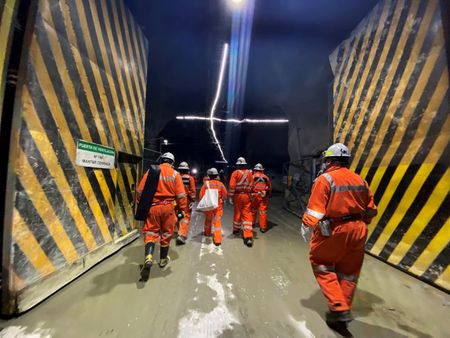By Fabian Cambero
SANTIAGO (Reuters) – An historic benefits package at BHP’s sprawling Escondida copper mine has raised the prospect for tough new negotiations and strikes at mines around the country, workers and analysts told Reuters.
Success at the bargaining table was driven by soaring copper prices, which broke records earlier this year and have remained high enough to whet workers’ appetite for raises, bonuses and a bigger slice of profits.
The higher bar comes as fresh labor talks are pending at a raft of mines across the world’s top copper producer. That includes Codelco’s flagship El Teniente mine, its smaller El Salvador and Ministro Hales mines, BHP’s Cerro Colorado, Anglo American’s El Soldado and KGHM’s Sierra Gorda.
Chile, unlike neighboring Peru, largely maintained its output of the red metal even during the worst of the pandemic, and workers said they are due their fair share after working through difficult, potentially deadly, conditions to keep mines open.
The payoff deal last week at Escondida, the world’s largest copper mine, came after a terse standoff that nearly ended in a strike.
Workers will receive benefits equivalent to about $30,000 each, including a bonus equivalent to 1% of dividends paid to shareholders and distributed to all workers in equal parts, the union said after inking the deal.
Unions had entered talks with high expectations, thanks to the high prices, said Juan Carlos Guajardo, head of Chilean consultancy Plusmining, adding that the resulting record-making benefits amounted to an “implicit endorsement of these greater demands.”
The benefits in Escondida were significantly higher than the $24,000 doled out in March to union workers at Antofagasta’s Los Pelambres mine.
Chile produces nearly 30% of the world’s copper, a key metal in construction and electric vehicle manufacturing.
PANDEMIC SACRIFICE
Three unions that recently walked of the job at Codelco’s Andina copper mine near the capital Santiago have made obtaining recognition of their work during the pandemic a key point in talks.
“Today we have to recognize [those sacrifices],” Manuel Cañas, secretary of one of the striking unions at Andina, told Reuters during a protest outside Codelco’s offices in Santiago.
The world’s largest copper miner, the state-run Codelco managed to slightly increase production during 2020 amid the worst of the outbreak.
Cañas acknowledged the smaller Andina might not have the sway of Escondida, but said high prices and hard work during the pandemic should, at minimum, force the company to “maintain current benefits not only for current workers but for those who may arrive.”
Codelco, which has pinched pennies to underwrite a 10-year, $40 billion plan to revamp its aging mines, has dug in its heels, saying that its final offer to the unions “constitutes the maximum effort of the company within the framework of its transformation.”
Workers at JX Nippon Mining’s Caserones mine, smaller than both Escondida and Andina, also walked off the job last week. The mine operator told Reuters there had been no progress in talks.
Alejandra Wood, executive director of Chile’s Center for Copper Studies (CESCO), told Reuters that discussions of hiking royalties on miners to help underwrite social programs, together with a move to rewrite the constitution, have also given miners more leverage.
“The price of copper is high, and there is an idea that profits must be shared,” she said. “Market and political conditions are undoubtedly influencing workers’ expectations.”
(Reporting by Fabian Cambero; Writing by Dave Sherwood; Editing by Aurora Ellis)





